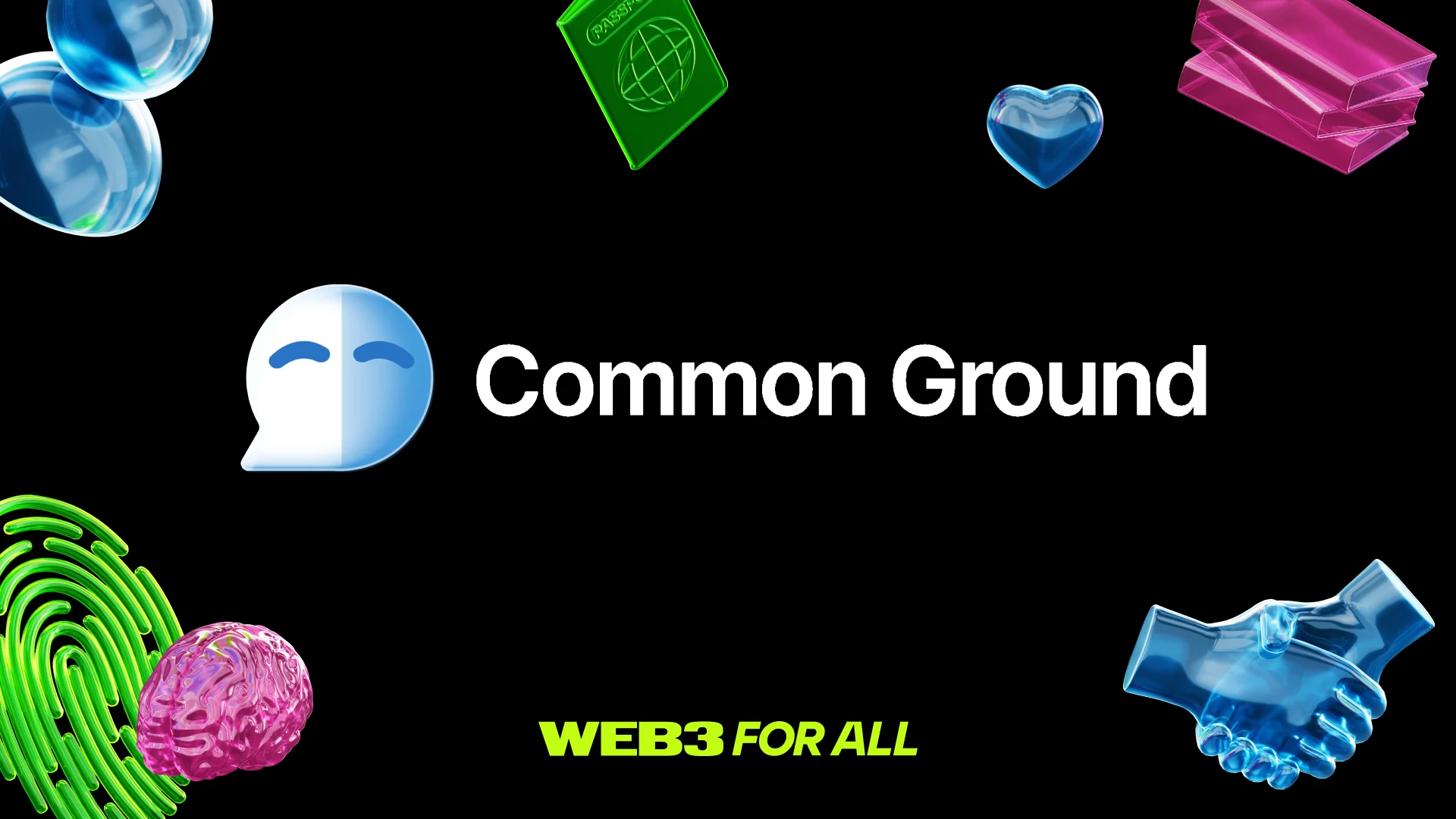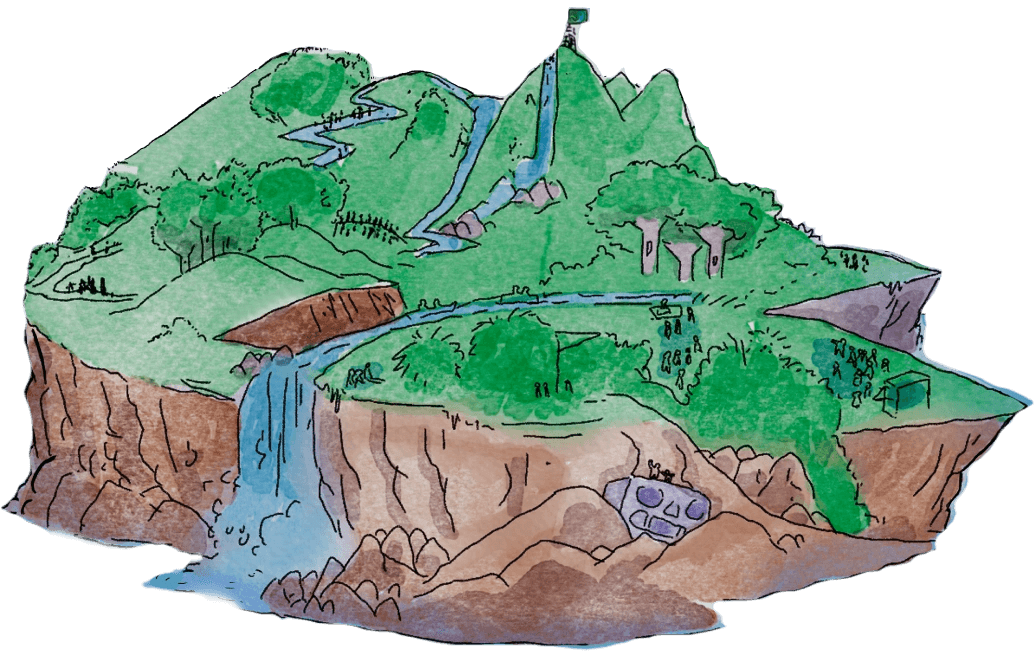Building a Web3-native Community Platform
Building a Web3-native Community Platform
This blog post explains how Common Ground respects user privacy, allows users to show their unique identities, and lets communities set their own rules. It also mentions future plans to add more cool features.

Florian
Published on May 18, 2023
May 18, 2023

The Genesis of Common Ground
When we embarked on our journey to create Common Ground in 2021, we thought: "Web3 deserves its own version of Discord." Our vision was to build a community-based chat app that allows real-time communication, integrated with Web3 protocols that Decentralized Autonomous Organizations (DAOs) use for governance, reputation, bounty programs, and Web3 identities.
"We envisioned a community chat app that natively supports all these features, eliminating the need for bots," recalls Jan, our CTO.
Overcoming the Challenges of Web3 Integration
We discovered that many users found implementing bots challenging, requiring a high level of technical expertise. To address these issues, we decided to build a Web3 version of a community chat app that natively supports all these features, eliminating the need for bots.
Prioritizing User Data Privacy
We also wanted to ensure a user-friendly data policy. We took this to the extreme by allowing users to own the organization that collects their data, ensuring that their data is treated correctly and not exploited.
"We're committed to ensuring that user data is treated correctly and not exploited," emphasizes Florian, a crypto lawyer and co-founder.
Building a Social Network for the 21st Century
As we progressed, we realized that we were building a social network for the 21st century. In this endeavor, identity emerged as one of the most crucial building blocks. Unlike platforms like Discord, Facebook, or Twitter, we wanted to create a system that respects and values the prismatic nature of identity.
Embracing the Prismatic Nature of Identity
In Common Ground, you start with a minimal viable identity, which is a wallet address generated for you on your local device. You can then choose to add more trust to it by selecting a username, adding a profile picture, or engaging in activities that accrue reputation.
Community Engagement and Rules
While we offer users this low barrier to entry, it doesn't mean that every community has to engage with your minimal viable identity. Communities can set their own rules and requirements for engagement, creating a dynamic social environment.
"Communities can set their own rules and requirements for engagement, creating a dynamic social environment," Florian points out.
Expanding Beyond Real-Time Chat
We initially started with real-time chat, but we soon realized that to build a viable community coordination platform, we needed to add more features. We introduced a community blog and a newsfeed to aggregate interesting posts from communities that users are a part of.
The Power of Multistakeholder Communication
One of Common Ground's key differentiators is its sophisticated roles and permission system. Communities can publish different posts and make them accessible to different roles within the community, facilitating multistakeholder communication.
Integrating Governance Voting
We also plan to integrate governance voting natively into the app using the Snapshot protocol. This will be a killer feature, as it will allow communities to conduct on-chain votes natively within the app. However, we also understand that not all communities are Web3 native or interested in on-chain voting. For these communities, we will offer off-chain polling.
"We're excited to integrate governance voting natively into the app using the Snapshot protocol," Jan shares.
Conclusion: A Versatile, User-Friendly, and Community-Focused Platform
We are building Common Ground to be a versatile, user-friendly, and community-focused platform. We are committed to providing an excellent user experience and are excited about the unique combination of features we offer. We believe that Common Ground will be a valuable tool for communities of all types, from DAOs and NFT communities to political parties and unions. We look forward to continuing to develop and improve our platform to meet the needs of our users and communities.
The Genesis of Common Ground
When we embarked on our journey to create Common Ground in 2021, we thought: "Web3 deserves its own version of Discord." Our vision was to build a community-based chat app that allows real-time communication, integrated with Web3 protocols that Decentralized Autonomous Organizations (DAOs) use for governance, reputation, bounty programs, and Web3 identities.
"We envisioned a community chat app that natively supports all these features, eliminating the need for bots," recalls Jan, our CTO.
Overcoming the Challenges of Web3 Integration
We discovered that many users found implementing bots challenging, requiring a high level of technical expertise. To address these issues, we decided to build a Web3 version of a community chat app that natively supports all these features, eliminating the need for bots.
Prioritizing User Data Privacy
We also wanted to ensure a user-friendly data policy. We took this to the extreme by allowing users to own the organization that collects their data, ensuring that their data is treated correctly and not exploited.
"We're committed to ensuring that user data is treated correctly and not exploited," emphasizes Florian, a crypto lawyer and co-founder.
Building a Social Network for the 21st Century
As we progressed, we realized that we were building a social network for the 21st century. In this endeavor, identity emerged as one of the most crucial building blocks. Unlike platforms like Discord, Facebook, or Twitter, we wanted to create a system that respects and values the prismatic nature of identity.
Embracing the Prismatic Nature of Identity
In Common Ground, you start with a minimal viable identity, which is a wallet address generated for you on your local device. You can then choose to add more trust to it by selecting a username, adding a profile picture, or engaging in activities that accrue reputation.
Community Engagement and Rules
While we offer users this low barrier to entry, it doesn't mean that every community has to engage with your minimal viable identity. Communities can set their own rules and requirements for engagement, creating a dynamic social environment.
"Communities can set their own rules and requirements for engagement, creating a dynamic social environment," Florian points out.
Expanding Beyond Real-Time Chat
We initially started with real-time chat, but we soon realized that to build a viable community coordination platform, we needed to add more features. We introduced a community blog and a newsfeed to aggregate interesting posts from communities that users are a part of.
The Power of Multistakeholder Communication
One of Common Ground's key differentiators is its sophisticated roles and permission system. Communities can publish different posts and make them accessible to different roles within the community, facilitating multistakeholder communication.
Integrating Governance Voting
We also plan to integrate governance voting natively into the app using the Snapshot protocol. This will be a killer feature, as it will allow communities to conduct on-chain votes natively within the app. However, we also understand that not all communities are Web3 native or interested in on-chain voting. For these communities, we will offer off-chain polling.
"We're excited to integrate governance voting natively into the app using the Snapshot protocol," Jan shares.
Conclusion: A Versatile, User-Friendly, and Community-Focused Platform
We are building Common Ground to be a versatile, user-friendly, and community-focused platform. We are committed to providing an excellent user experience and are excited about the unique combination of features we offer. We believe that Common Ground will be a valuable tool for communities of all types, from DAOs and NFT communities to political parties and unions. We look forward to continuing to develop and improve our platform to meet the needs of our users and communities.
The Genesis of Common Ground
When we embarked on our journey to create Common Ground in 2021, we thought: "Web3 deserves its own version of Discord." Our vision was to build a community-based chat app that allows real-time communication, integrated with Web3 protocols that Decentralized Autonomous Organizations (DAOs) use for governance, reputation, bounty programs, and Web3 identities.
"We envisioned a community chat app that natively supports all these features, eliminating the need for bots," recalls Jan, our CTO.
Overcoming the Challenges of Web3 Integration
We discovered that many users found implementing bots challenging, requiring a high level of technical expertise. To address these issues, we decided to build a Web3 version of a community chat app that natively supports all these features, eliminating the need for bots.
Prioritizing User Data Privacy
We also wanted to ensure a user-friendly data policy. We took this to the extreme by allowing users to own the organization that collects their data, ensuring that their data is treated correctly and not exploited.
"We're committed to ensuring that user data is treated correctly and not exploited," emphasizes Florian, a crypto lawyer and co-founder.
Building a Social Network for the 21st Century
As we progressed, we realized that we were building a social network for the 21st century. In this endeavor, identity emerged as one of the most crucial building blocks. Unlike platforms like Discord, Facebook, or Twitter, we wanted to create a system that respects and values the prismatic nature of identity.
Embracing the Prismatic Nature of Identity
In Common Ground, you start with a minimal viable identity, which is a wallet address generated for you on your local device. You can then choose to add more trust to it by selecting a username, adding a profile picture, or engaging in activities that accrue reputation.
Community Engagement and Rules
While we offer users this low barrier to entry, it doesn't mean that every community has to engage with your minimal viable identity. Communities can set their own rules and requirements for engagement, creating a dynamic social environment.
"Communities can set their own rules and requirements for engagement, creating a dynamic social environment," Florian points out.
Expanding Beyond Real-Time Chat
We initially started with real-time chat, but we soon realized that to build a viable community coordination platform, we needed to add more features. We introduced a community blog and a newsfeed to aggregate interesting posts from communities that users are a part of.
The Power of Multistakeholder Communication
One of Common Ground's key differentiators is its sophisticated roles and permission system. Communities can publish different posts and make them accessible to different roles within the community, facilitating multistakeholder communication.
Integrating Governance Voting
We also plan to integrate governance voting natively into the app using the Snapshot protocol. This will be a killer feature, as it will allow communities to conduct on-chain votes natively within the app. However, we also understand that not all communities are Web3 native or interested in on-chain voting. For these communities, we will offer off-chain polling.
"We're excited to integrate governance voting natively into the app using the Snapshot protocol," Jan shares.
Conclusion: A Versatile, User-Friendly, and Community-Focused Platform
We are building Common Ground to be a versatile, user-friendly, and community-focused platform. We are committed to providing an excellent user experience and are excited about the unique combination of features we offer. We believe that Common Ground will be a valuable tool for communities of all types, from DAOs and NFT communities to political parties and unions. We look forward to continuing to develop and improve our platform to meet the needs of our users and communities.
Read more articles



Web3 for All
Consensys, the company behind Metamask, Infura, Linea and other significant projects in web3, features Common Ground prominently on their blog.

·
Oct 2, 2024



The App Revolution: what's hot in web3 right now?
After years of intense focus on infrastructure and protocols, the spotlight is finally shifting to applications. In this blog post, we'll dive deep into Web3 applications, exploring how they're reshaping various aspects of our digital lives.

Florian Glatz ·
Sep 26, 2024



Ecosystems as Groups of Groups: a new primitive in large-scale coordination?
Web3 more than any other sector of the economy explicitely designs, develops and evolves the idea of ecosystems. For the first time, a group of researchers in web3 has analyzed the ecosystem phenomenon as an emerging group of groups primitive.

·
Sep 5, 2024
Menu
Menu
